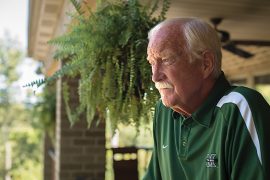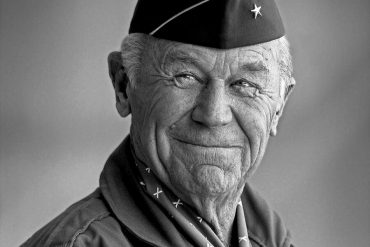All the leading indicators point to a stormy 1992 season.
By Ernie Salvatore
HQ 12 | SUMMER/AUTUMN 1992
It’s game time for Marshall University Head Coach Jim Donnan, and his composure remains intact. A stoic in a green baseball cap, with a slow, down-home, monotone drawl, even when at his upbeat best, the leader is about to face the most challenging season of his career. No stranger to victory, he proudly sports a National Championship ring on his left hand, a la’ his days as offensive coordinator at the powerful University of Oklahoma.
But the task at hand today finds Donnan at the helm of his own operation. And, with all eyes of Huntingon focused on the head coach, the sweet smell of a hometown National Championship of their own is in the air …
Even before a single play was run from scrimmage this year, or the first steak burned on a tailgate grill, Marshall University’s 1992 football season had already begun to acquire historic dimensions, to wit:
For the first time ever the Thundering Herd was attracting national attention by leading eight major preseason polls as the No. 1 contender for a national championship.
And for the first time ever in Huntington’s history, the city had been anointed the designated host of a national championship – garnering the NCAA Division 1-AA championship game.
Because 1-AA is Marshall’s division, the ironies weren’t lost on The Faithful’s gray hair set. It knew that if the forecasts were correct, the culmination of the Herd’s long journey back down the glory road it had begun on Sunday morning, November 15, 1970, would climax right here at home. The seeds for these goings on were first planted last year, actually. Mark the date: Sept. 7, 1991, opening night for Marshall’s beautiful new football stadium. It was under the warmth of a sunset red sky that Lee Moon convinced himself to take a shot at, well, the moon.
Why not, the athletic director reasoned, put the stadium and region on a national network television stage as hosts of the 1-AA championship football game?
Crazy? Moonstruck?
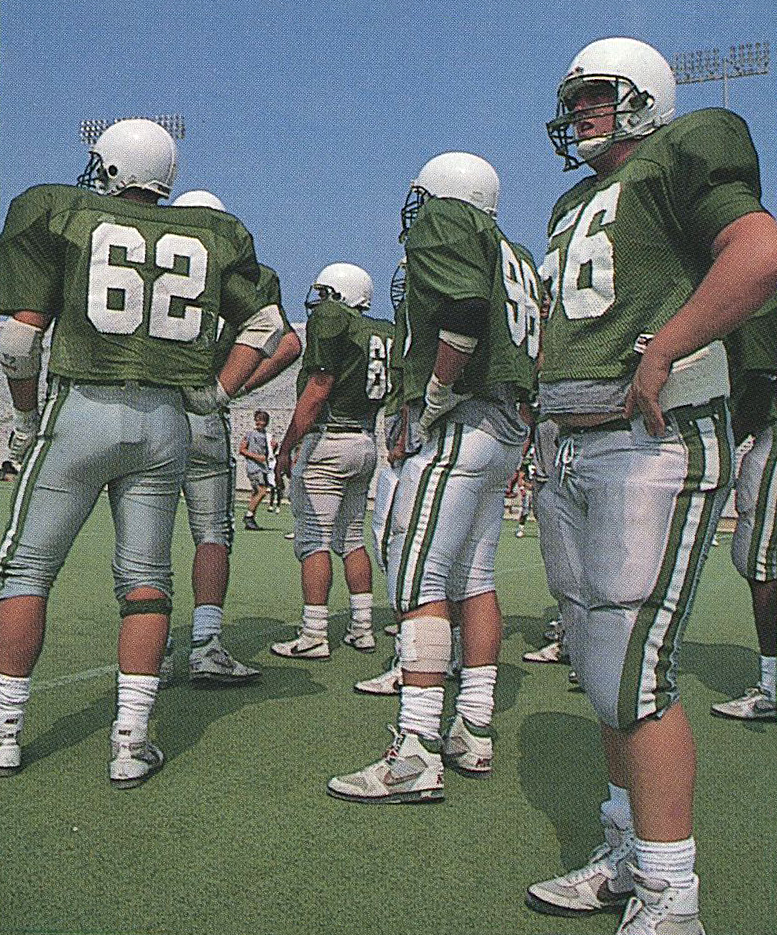
Well, pardon the pun! But let’s give the guy his due. He had solid evidence laying right out before him that the idea was worth a long, hard look, i.e., the 33,116 souls who’d paid, on average, $11 a piece to pack themselves into the 28,000 seat wonder while, in the process, beating the mighty West Virginia University football coliseums’ attendance for that same day.
Simple arithmetic told him that 5,000 of them had been willing to stand or squat just to be a part of the biggest night in Marshall’s sports history. The region’s too, ergo the 50-mile radius encompassing Charleston to the northeast, Ashland, Ky., to the south and Portsmouth, Ohio, to the west.
Obviously, he’d picked up “a heaven-sent message” in that stunning response that was further enhanced by the storybook finish of the inaugural game itself. It was a 24-23 thriller favoring the home side that was undecided until the final seconds over highly-touted New Hampshire.
The attendance, the happy ending, the scenic stadium setting, and Coach Jim Donnan’s emerging football dynasty, all convinced Moon that Marshall football and Huntington both deserved a larger audience – not only to improve their images but as a means for Marshall athletics “to give something back now that we had achieved success.”
The “giving back,” he later explained, would be in the form of pumping an estimated $20 million into the region’s ailing economy. That’s the financial impact the championship game is expected to generate, using a multiplier of seven for each dollar a visitor spends.
But first, Moon knew he faced a tough job of selling the idea to the NCAA types who thought West Virginia, beyond Morgantown, was Third World country. Getting the actual job done would be easier; and, so it came to pass that his handpicked, blue ribbon “Huntington Sports Committee,” fortified by a stunning 20-minute video produced and directed by Jack Deakin of WSAZ-TV, convinced the 1-AA championship site committee that ours was, indeed, the place to hang their golden cleats for the next two years!
It was a gutsy gamble with a style that was a primer on how to look one’s best whether bidding for a football game or a tiddlywinks festival. Chairman Bennie Hollis of the NCAA site committee, was so impressed that he called it “the best presentation” he’d ever seen and Bennie’s seen a few in his 35 odd years at Northeast Louisiana State.
Moreover, the timing was exqms1te. It coincided neatly with the amazing national consensus that saw the Thundering Herd ranked No. 1 by The Sporting News, Street & Smith, Don Hansen’s, Don Heinrich’s, Athlon Publications, Sports Illustrated, USA Today and the NCAA Coaches polls. Only something called Dan and Peggy’s College Football Report, an obscure service based in Cedar Rapids, lair of the Northern Iowa University Panthers, dissented. By ranking the Herd No. 3 behind Middle Tennessee and the hometown Panthers, Dan and Peggy’s exacted a measure of revenge by ignoring the return of the Herd’s 15 starters, three All-Americans, and 43 lettermen who’d butchered their Panthers, 41-13, last season m the 1-AA quarterfinals.
Sour grapes? Silly question.
Still, at the end of July after the Herd swept two more polls – the Southern Conference coaches and media polls – some fears were raised that this icing on the preseason cake might be just enough to give the Herd a bad case of indigestion worrying about the implications of failure.
Would a championship game in Huntington without Marshall, perish the thought, prove just as sweet?
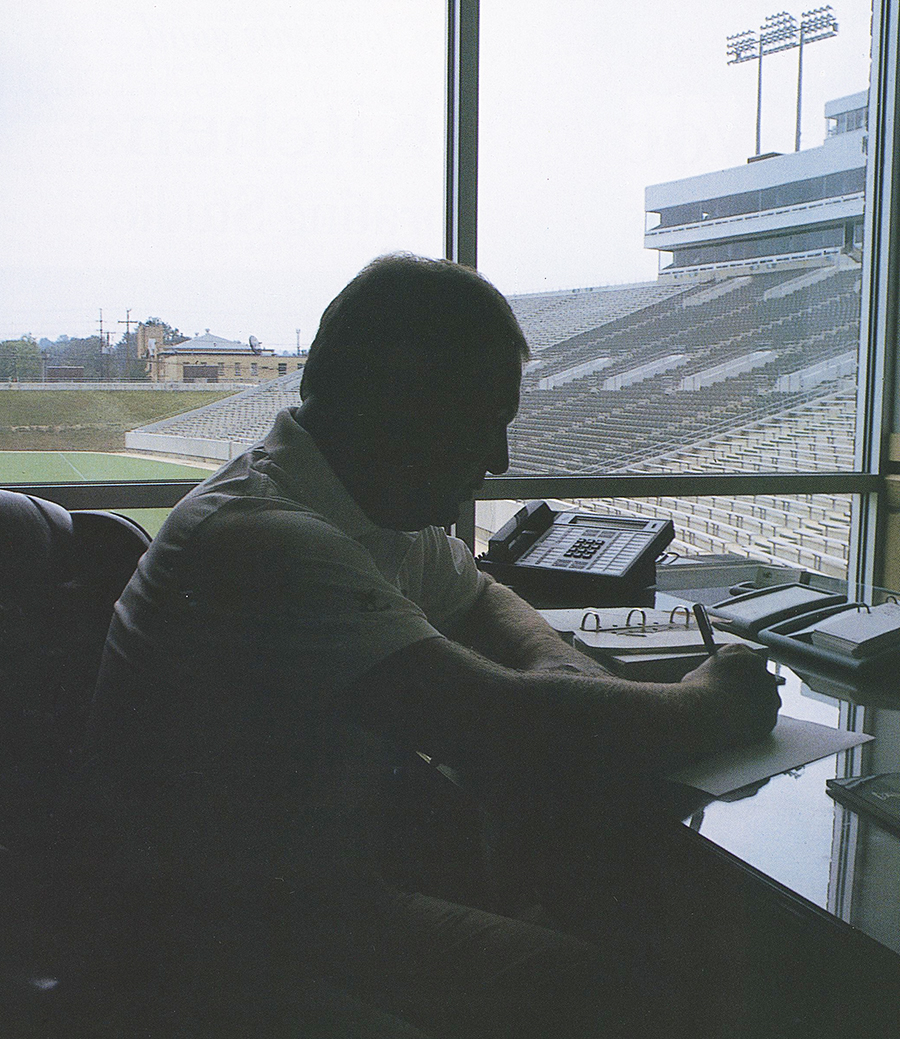
The fruits of success would be sweeter, of course, giving Marshall the luxury of playing in the 1-AA final (its third in five years) for the first time at home, before the usual packed stands, a national CBS-Television audience, and thousands of wide-eyed, high school hot shots.
“In any case, with or without us, the country will discover we’re not located on some backwater mountaintop down here,” Moon, a Virginian by birth, said. “Besides that, we’ll have built-in safeguards just in case we’re not in it. We’re designing a festive, bowl-like Championship Week here with the game itself as the centerpiece.”
To accomplish this, a four day schedule of varied supporting events has been locked into “Championship Week,” to keep visitors occupied. It will begin Wednesday, Dec. 16, run through game day on Saturday, Dec. 19 and include a welcoming luncheon, a four hour dining-dancing cruise on the West Virginia Belle as it plies the Ohio River, a championship awards luncheon, special bus tours of the city and region, a reception by Marshall President J. Wade Gilley, a food tasting extravaganza from area restaurants for the public in the Huntington Civic Center, plus pep rallies, impromptu parades, and band concerts.
There will be no shortage of things to do up to the 12-noon kickoff. In fact, the only shortage foreseen will be hotel rooms in the immediate Greater Huntington area.
According to Norma Ciccarello, director of sales and marketing for the Radisson Hotel Huntington, the game’s official headquarters, only 1,314 rooms are available in the eight hotels listed in the official schedule of events pamphlet and the unlisted Red Rooflnn on the eastern outskirts of Huntington. She warned that because the game’s Dec. 19 date is so close to Christmas, there could be “no room at the inn” months before the kickoff – save those set aside at the Radisson Hotel Huntington and· Holiday Inn Gateway for the teams and NCAA officials.
Realities persisted in another direction, however, that the mixture of the preseason poll hype and the pressure of getting into the title game could turn into a noxious curse for the Thundering Herd.
Jim Donnan, the Marshall Head coach, has no such fears.
“I don’t worry about the pressure of being No. 1,” he said. “I’m not worried about the pressure of getting into a championship game. We’re used to pressure. Everyday there’s pressure. Pressure to do this. Pressure to do that. No sense worrying about it. We’ve still got to play the games – 15 if we’re luck .. “Y.”
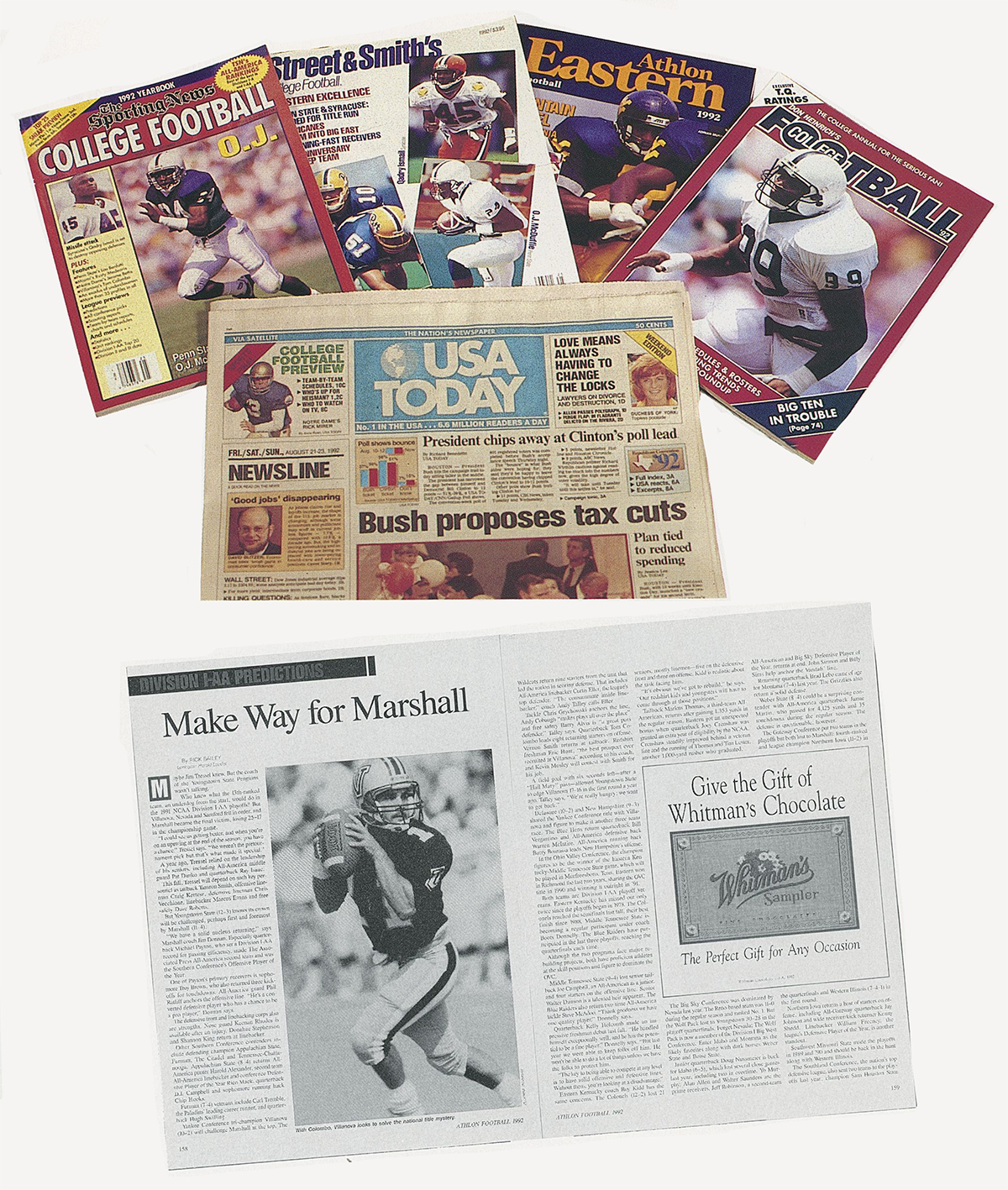
Fifteen is Donnan’s “Magic Number.” Playing that many would get the Herd into the coveted championship game for the second straight year. Still, he insisted, that wasn’t his main goal, as he kept telling everybody.
“Our main goal,” he said, “is to win the league. If we can do that it’ll put us in position to be in the play-offs. Hence, the title game, if the Gods are favorable and the Herd’s key personnel escape serious injury.”
Donnan did concede, however, that the athletic department, the community, and “everybody else,” would still focus chiefly on the you-know-what game.
The pressure will be alleviated somewhat by the return of starting quarterback Michael Payton, last year’s Southern Conference Offensive Player of the Year and a 1992 second team Associated Press All American. Payton, a senior from Harrisburg, Pa., set a Division 1-AA record for passing efficiency last year. His red hot passing attack alone produced nearly 430 yards per game.
And while those types of numbers were enough to take the Thundering Herd to the 1991 National Championship game in Statesboro, Ga., they fell short of capturing the elusive title in the closing minutes to Youngstown State.
“Last year was a bonus for us,” recalls Donnan. “Sure, we would have liked to have won it. We should have won it. But this is the year. This is the year of the Herd.”
Donnan, of course, is referring to the very real possibility, according to such publishing powerhouses as Sports Illustrated, that the Herd will return to the National Championship game in 1992, this time in Huntington.
“We’d enjoy playing in it here.” Donnan said, “but that has to be the least of our worries. What we try to do is tell our players that no game is more important than any other early in the season. We really are careful about trying to focus too far ahead. So, instead, we’re taking the approach that ‘Boy, it’s great that everybody thinks a lot of us and that we’ve achieved such a stature. You should be proud of that.’ We used that at Oklahoma in our favor from the standpoint that we expected to win.”
Moon had adopted a similarly pragmatic stance organizing a plan to bid for the 1-AA’s crown jewel.
“I knew it would have to be a civic-wide project undertaken by the doers, not the wanabees or the maybes.”
So he picked several people single handedly, based on their strong personality traits or their professional backgrounds.
In addition, he invited several others just to get their responses. “And I didn’t come up empty handed,” he noted.
Out of this was born the Huntington Sports Committee, a group rooted in all key sectors of the city and the region. Chaired by Moon, the members included:
Huntington Mayor Robert R. Nelson, a self-described sports nut.
Ron Smith, president of the Downtown Improvement Association.
Beverly McKinney, vice-president of the First Huntington National Bank.
Jerry Krueger, managing director of the Cabell-Huntington Visitors and Convention Bureau.
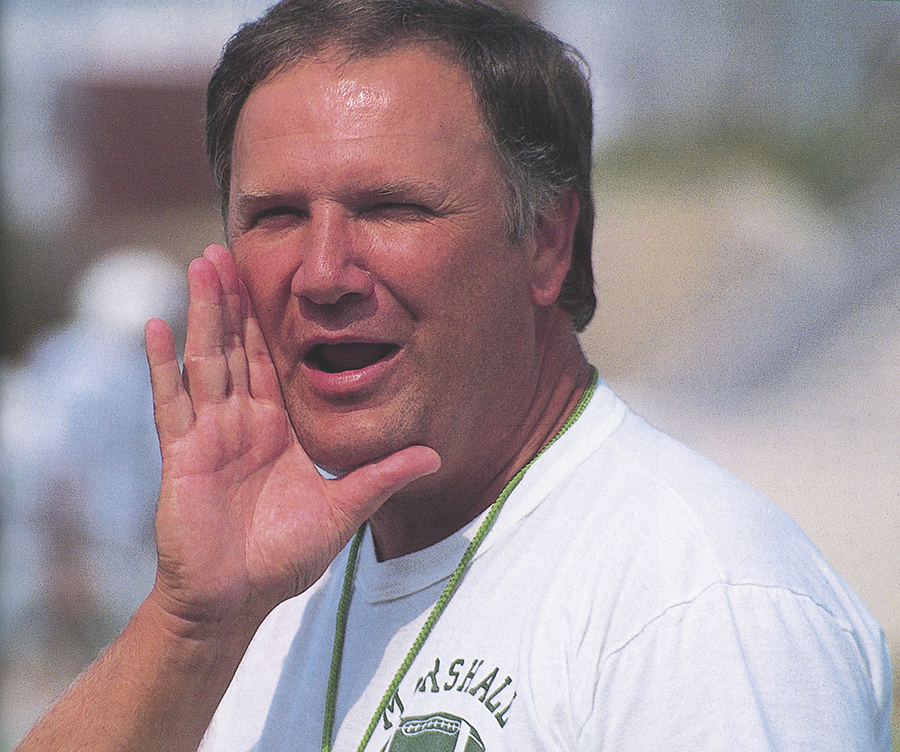
Dr. Edward (Ned) Boehm, Jr., MU’s vice-president for Institutional Advancement.
Dr. Jose I. Ricard, president of the Cabell County Medical Society and director of the Marshall School of Medicine’s division of sports medicine.
Jack Cipoletti, executive vice-president of AIM Communications Inc. of Charleston.
Rick Nolte, sports editor of The Herald Dispatch.
And Parker Ward, immediate past president of the Huntington Rotary Club, under writers of the $250,000 guaranteed winning bid Marshall submitted. Ward in particular, whose father died on that tragic day in 1970, demonstrated that a new era had begun. For not only had the football program come of age, but so too had a new generation of community leaders.
It was an impressive group in that it reflected the unique nature of the bid itself. Instead of dealing strictly with finances and leaving the details and the planning for later, as had become the custom, the Huntington Sports Committee’s bid did both to the surprise of the site committee. This was done with a series of informative, 10 to 15 minute briefings by every sports committee member. This illustrated the bid’s broad-based support.
But, Deakin’s film was the clincher. After having been briefed verbally, the site committee was now given the chance to see these same factors come to life. Divided roughly into four parts, the video opened by focusing on Huntington’s photogenic beauty to provide “a sense of who we are, what we look like,” said Deakin.
Next it moved to the Huntington and Charleston airports to allay any fears about travel. Then the cameras panned over the stadium itself, nosing over and around its plush sky boxes, the 9,000 chair backed seats, the splendid press box to illustrate state of the art print and electronic communication facilities; and, finally that incredible opening night crowd to emphasize fan support. Here, a weather report suddenly flashed onto the screen to assure Hollis’ spellbound group that there is typically less than a 30 percent chance of rain in Huntington every day in December.
The site committee’s subsequent vote was, reportedly, unanimous.
•••••
Now, all that remains is the culmination of 22 years of re-building a football program from the ashes of that tragic Autumn day in 1970. And should this year’s team fall short of capturing the crowned jewel of its division, the luster and shine of the 1992 season, and the seasons to come, will continue to dazzle. Because the seeds have been planted and the program has arrived. Marshall University is indeed poised for greatness.




